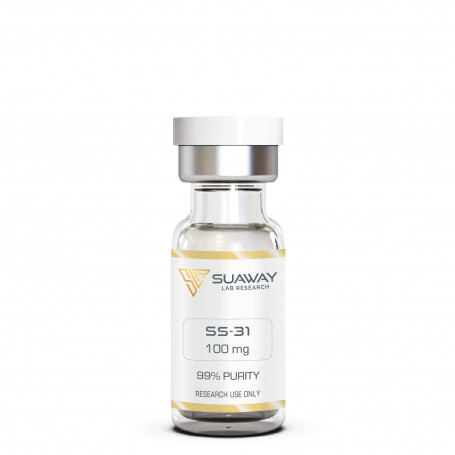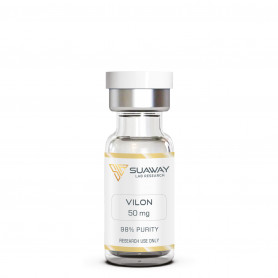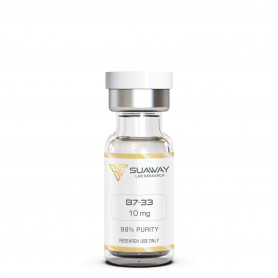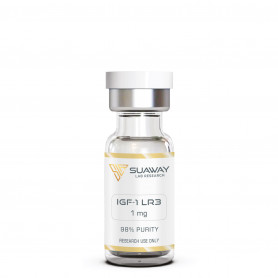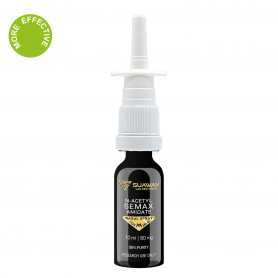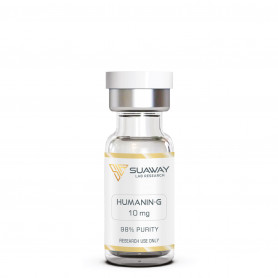SS-31 - 100mg
SS-31 is a remarkable compound known for its ability to enhance mitochondrial function and facilitate the production of energy through ATP synthesis. Extensive research has demonstrated its potential in reducing the presence of inflammatory cytokines that contribute to oxidative stress and inflammatory ailments, including but not limited to Alzheimer's disease, Parkinson's di
Description
STRUCTURE
Sequence: H-D-Arg-(2',6'-dimethyl-Tyr)-Lys-Phe-NH2
Molecular Formula: C32H49N9O5
Molecular Weight: 639.39 g/mol
CAS number: 736992-21-5
Peptide purity: greater than 99%
Other details: No TFA Salt
DESCRIPTION
SS-31, also known as Elamipretide, is a promising therapeutic compound that has gained considerable attention in recent years for its potential in treating various diseases. This peptide is specifically designed to target mitochondria, the vital powerhouses of the cell responsible for energy production and cellular metabolism. The peptide has a unique sequence of amino acids that enables it to bind to cardiolipin, a key phospholipid found in the inner mitochondrial membrane.
The primary mechanism of action of SS-31 involves its ability to scavenge reactive oxygen species (ROS) within the mitochondria. ROS are natural byproducts of cellular respiration but can become harmful when produced in excess. They can lead to oxidative stress, causing damage to cellular components, including lipids, proteins, and DNA. SS-31's binding to cardiolipin helps neutralize ROS, reducing oxidative stress and preventing mitochondrial damage. Furthermore, SS-31 has been shown to stabilize mitochondrial membranes, enhance energy production, and improve mitochondrial function. It can modulate mitochondrial permeability transition pore (mPTP), a structure involved in cellular stress response and cell death. By regulating mPTP, SS-31 helps maintain mitochondrial integrity and prevents the release of pro-apoptotic factors, thereby promoting cell survival.
Neurodegenerative Diseases:
Neurodegenerative disorders, such as Alzheimer's disease, Parkinson's disease, and Huntington's disease, are characterized by the progressive degeneration of neurons in specific regions of the brain. Mitochondrial dysfunction and oxidative stress play significant roles in the pathogenesis of these diseases. SS-31's ability to target mitochondria and reduce oxidative stress makes it a potential therapeutic agent. Studies conducted in animal models and cellular systems have demonstrated that SS-31 can preserve mitochondrial function, reduce oxidative damage, and enhance cellular energy production. These effects have shown promise in ameliorating disease progression and protecting neurons from degeneration.
Cardiovascular Conditions:
Cardiovascular diseases, including heart failure, myocardial infarction, and ischemia-reperfusion injury, are characterized by compromised cardiac function and impaired blood flow to the heart. Mitochondrial dysfunction and oxidative stress contribute significantly to the progression of these conditions. Animal studies have revealed that SS-31 can improve cardiac function, reduce infarct size, and prevent cell death in the myocardium. It achieves this by preserving mitochondrial integrity, enhancing energy production, and reducing oxidative stress within the cardiac cells.
Age-Related Decline:
Aging is associated with a gradual decline in mitochondrial function and increased oxidative stress, leading to a range of age-related diseases and functional impairments. Animal studies have shown that SS-31 can improve mitochondrial bioenergetics, reduce oxidative damage, and enhance cellular function in aged tissues. These effects have the potential to mitigate age-related decline in various organs and systems, improving overall health and functional capacity in the elderly population.
Retinopathies:
Retinopathies encompass a group of disorders affecting the retina, the light-sensitive tissue at the back of the eye. Conditions such as diabetic retinopathy and age-related macular degeneration (AMD) involve oxidative stress, inflammation, and mitochondrial dysfunction. SS-31's ability to target mitochondria and reduce oxidative stress holds promise for treating retinopathies. Preclinical studies have demonstrated that SS-31 can protect retinal cells, reduce inflammation, and improve retinal function in animal models of retinopathy. These findings suggest that SS-31 may have potential therapeutic applications in the treatment of retinal diseases.
REFERENCES
N.M. Alam et al., "Treatment of age-related visual impairment with a peptide acting on mitochondria" [PMC]
V. Righi et al., "Mitochondria-targeted antioxidant promotes recovery of skeletal muscle mitochondrial function after burn trauma assessed by in vivo 31P nuclear magnetic resonance and electron paramagnetic resonance spectroscopy" [PMC]
N.T. Nhu et al., "Neuroprotective Effects of a Small Mitochondrially-Targeted Tetrapeptide Elamipretide in Neurodegeneration" [PubMed]
J.A. Grosser et al., "The effects of a mitochondrial targeted peptide (elamipretide/SS31) on BAX recruitment and activation during apoptosis" [PubMed]
DISCLAIMER
This product is intendend for lab research and development use only. These studies are performed outside of the body. This product is not medicines or drugs and has not been approved by the FDA or EMA to prevent, treat or cure any medical condition, ailment or disease. Bodily introduction of any kind into humans or animals is strictly forbidden by law. This product should only be handled by licensed, qualified professionals.
All product information provided on this website is for informational and educational purposes only.


